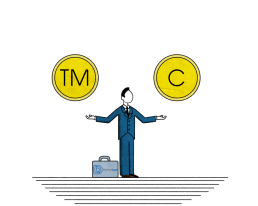Trademark vs. Copyright: What's the Difference
When creating a new product or service, or even forming a new entity, understanding the differences between trademarks and copyrights can be vital.
The first step is really a simple one: it’s important to find the right trademark lawyer for you. At Drumm Law, we’re proud to offer attorneys with expertise in the area of trademarks. We work with all of our clients to help them efficiently, and cost-effectively, setup their businesses and position them to be the most successful versions of themselves.
“A lot of times, (people) misuse the word copyright, like ‘I want to copyright my brand,’” said Mike Drumm, attorney and founder of Drumm Law. “One of the most clever sayings in the world is “I want to protect (my brand). A trademark protects a brand, copyright protects you from copying a product like music or a book.”
In short, the difference between trademarks and copyrights, although seemingly confusing, can be simply conveyed as this: trademarks protect commercial names, phrases and logos (i.e. the name of your beer and the logo of your company). Copyrights generally protect creative works (i.e. the design of the label on your beer). While both may be important, it’s the trademarks that are of the utmost importance for breweries.
“Trademark is, ‘I have a brand and you can’t have a brand that looks like mine,’ but copyrighting is protecting something you created — not the idea,” Drumm added.
About Drumm Law
At Drumm Law, we offer an experienced team of trademark attorneys, proficient in helping our clients:
- Select and file proper trademark applications
- Undergo trademark clearance searches
- Defend/file trademark application prosecution
- Monitor trademark usage and maintenance
- Conduct intellectual property audits
- And more…
Contact Drumm Law’s trademark lawyers to receive help with your trademarking processes at.
